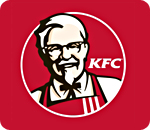 The issue came up in December when officials in China's commercial hub of Shanghai and the northern province of Shanxi were looking at KFC suppliers following claims that the chicken the company was selling had a high antibiotics content.
The issue came up in December when officials in China's commercial hub of Shanghai and the northern province of Shanxi were looking at KFC suppliers following claims that the chicken the company was selling had a high antibiotics content.The scare caused a six percent drop-off in China sales of KFC's parent company, Yum! Brands in the final quarter of 2012, Agence France Presse reported, which was more severe than the firm's previous estimate of a four percent decline.
Company officials knew of the problem in 2010, but kept quiet
KFC says it will no longer use chicken farms that run potential risk of further supplying tainted product, step up its screen process of suppliers and increase self-inspections to address future food safety concerns, the company said in a statement.
"It will always be our top priority to provide customers with the safest chicken with the best quality," Yum China's chairman and top executive, Sam Su, said in the statement. "We have seen some safety problems from the incident...and we aim to address the issue within the shortest time."
The company also vowed to improve its communication efforts with the Chinese government and the public following an admission by the Chinese branch of Yum in January that it failed to inform the proper authorities about tests showing high levels of antibiotics in chicken.
Yum officials said the company was aware of the problem via testing by a third party in 2010 and 2011 but did not report the findings to authorities, according to a statement by the Shanghai government in December.
China has been the focus of a number of food safety incidents in recent months and years. Here are just a few of the most high-profile incidents:
-- In 2008, one of the biggest scandals occurred when melamine, an industrial chemical, made its way into dairy products, killing at least six babies and making 300,000 people sick. This scandal was kept under wraps by Chinese authorities for months to avoid embarrassment ahead of the Olympic games held in Beijing. When word got out, average Chinese citizens were outraged at the government, as confidence in the ruling regime's ability to regulate food safety fell dramatically.
-- Our editor-in-chief and founder, Mike Adams, the Health Ranger, has reported recently that China is essentially awash in pollution, and that the nation is "an environmental nightmare." As such, it's difficult if not impossible to trust that so-called "organic" products from the world's most populous nation are safe, let along truly organic.
-- In April 2011, police in the northeastern city of Shenyang seized 40 tons of bean sprouts that were tainted with sodium nitrite and urea, as well as antibiotics and a plant hormone known as 6-benzyladenine. The chemicals were used to make the sprouts grow more quickly and look "shinier" at the marketplace. 12 people were arrested.
-- More than three-and-a-half tons of "yard-long" green beans that were contaminated with a banned pesticide, isocarbophos, were destroyed after being found on sale in the central city of Wuhan in March 2010. The beans originated in the southern city of Sanya; allegations of another attempted cover-up came after the Sanya agricultural law enforcement bureau decided it would be "inconsiderate" of Wuhan authorities to make the case public.
-- A professor from Wuhan Polytechnic University conducted an undercover investigation in March 2010 and turned up this disturbing fact: One in 10 of all meals in China were made using recycled oil, "often scavenged from the drains beneath restaurants," London's Telegraph newspaper reported. State food and drug administration officials issued a nationwide emergency before launching an official investigation into the use of the "sewer oil."


